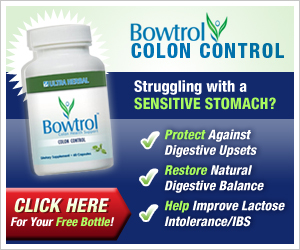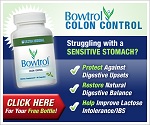Colon Health Tips
How's your colon health? Avoid constipation, gas, and bloating while you keep your digestive system working the way it should with these tips for colon health.
How's Your Colon Health? Make It Healthier With These Tips.
If you read the popular magazines these days, there are all kinds of scary stories about this person or that suffering, and perhaps dying from, some illness related to the colon. In a way, it's good that these stories are out there as they help people become aware of a major health issue. On the other hand, sometimes they are telling you what is good for digestive problems just trying to sell magazines and seem to be more interested in scaring people into buying colon health products or trying the latest fad for colon health.
Some of these products and ideas have merit, some have some truth in them, and, some are just plain nuts.
Like so many other things in life, the best way to begin to proctect yourself against colon problems and illnesses of the digestive system, is to arm yourself with facts about how to have a healthy digestive system.

There is an old joke about parts of the body, heart, lungs, liver, etc., arguing about which was the most important. Eventually, the colon spoke up, claiming that it was the most important. All the other body parts laughed, until the colon quit working properly for a while, and all the other body parts began to suffer.
Okay, that's a cleaned up version of an old high school joke, but, you get the point. If the colon ain't happy, ain't nobody happy.
In fact, many health care professionals believe that many illnesses and conditions can be traced, at least in part, to colon health...or lack of it. Whether or not that can be proven, it is still very true that a properly functioning digestive system is important to overall health.
While "no news is good news", at least generally, when it comes to colon problems, it is still a good idea to have regular checkups of the colon, and other parts of the digestive system, especially as you age. While colon cancer may not have a lot of outward signs, it can become deadly in a short period of time, and, often can only be detected by a colonoscopy.
Day to day life is always full of opportunities to assess your personal colon health, and to do things to help keep your colon healthy. Nearly everybody experiences mild stomach upset, constipation, or diarrhea from time to time, particularly as you age. This is not necessarily anything to worry about. On the other hand, if these symptoms persist, then you may have a real colon health problem.
However, even this is not a perfect means of dealing with digestive health health.
You should, as I alluded to earlier, have regular checkups. In addition to the colonoscopy, your doctor may recommend an endoscopy, x-rays, or other investigative lab work.
GET THE RIGHT AMOUNT OF FIBER
A diet which contains a fair amount of fiber is recommended, based on many valid studies. The problem, if there is one, is that there is so much hype on the subject, and so many people trying to sell their particular fiber supplement.
The bottom line, based on valid research, is that most studies indicate that a total of 20-35 grams of fiber a day is what is needed for good colon health.
PORTION CONTROL AND THE FRENCH PARADOX
Of course, there are more things to eat than just foods that contain fiber, and, proper selection of these foods can also contribute to digestive health. While selection of the particular foods can be important, controlling the size of meals, or using portion control, is perhaps an even more important tool in a plan for digestive health.
Ever hear of the French Paradox?
Although modern life is gradually taking effect even in France, for many years, the French tended to eat some of the richest, fattest, most calorie loaded foods in the world. However, their obesity rate, digestive problems, and level of heart disease, was much lower than those of most other industrialized nations.
Studies eventually revealed that the French habit of eating delicious foods in small quantities (portion control) was one of their most effective tools in their digestive health arsenal.
Most restaurant meals in an American restaurant, and fast food sandwiches, can have anywhere from 500+ calories to over 1,000. That does not include sodas, fries, extra mayo, salad dressing, or whatever else you may add to them. Many of these are not only high in cholesterol, sodium, and fat, but they are low in fiber as well.
After fiber, one of the best things you can do for colon health is to eat meals with small portions, and, believe it or not, eat small meals with a couple of extra snacks, or mini-meals, mixed in. Your body is only able to process so much food at one time, and excess generally gets stored as fat. Excess body fat can contribute to digestive ill-health as well as many other health conditions.
EXERCISE MORE
Regular exercise also contributes to colon health. It not only helps prevent the build up of body fat, but, it also massages the digestive tract, keeping things moving, which helps prevent colon health problems. Exercise helps keep all systems of the body, many of which contribute to digestive health, functioning at their optimum level.
DRINK WATER
The universal lubricant, and major ingredient of most of the body's cells, fluids, and organs, water helps keep digestive matter soft, and lubricates the digestive system. For many who regularly suffer from constipation and other colon health problems, a couple of extra glasses of water each day may do a world of good.
REDUCE STRESS
High stress, or constant stress, can interfere with the proper functioning of the disgestive system, and contribute to digestive health problems. In fact, many researchers consider stress to be a major health risk factor for many conditions, and, at least one researcher who specializes in stress, and stress-related conditions, considers it to be THE worst risk factor, above even smoking and other activities which can predispose us to ill-health.
Exercise helps reduce stress, as does some regular, restful interest. This can be anything as simple as a hobby, or can be very targeted, such as meditation, which has been shown to be very effective in reducing stress. If you really want to get the most bang for your buck, try yoga, as it combines exercise, relaxation, stress reduction, and healthy lifestyle choices in one package.
TAKE COLON HEALTH SUPPLEMENTS
There are a wide range of supplements you can take regularly to help maintain colon health.
Shaklee has a wide range of products which target digestive health.
Bowtrol Colon Control is a selection of natural herbal products which work in various ways to reduce digestive problems and promote colon health.
Digest It is a colon cleansing product which can not only help relieve periodic colon discomfort, but which has also been shown to help with weight loss.
NO MAGIC BULLET BUT AN ARSENAL OF AMMUNITION
When it comes to achieving and maintaining digestive health, there's usually no single "magic bullet". However, making proactive lifestyle choices that encourage and promote the health and proper functioning of the digestive system is a good idea for two reasons:1. Obviously, because they do what they do for colon health, but also because...In other words, choosing to make colon health a priority is also going to have benefits for the entire body, so, I guess it's true that, "when the digestive system is happy, everybody's happy"!
2. The same choices which help keep your digestive system functioning at its peak also help almost every other part of the body.
Health Products - Colon Health - Articles - Colon Health Tips
Page Updated 1:05 PM Tuesday, October 24, 2023
Copyright 2023 by Donovan Baldwin
Sitemap



